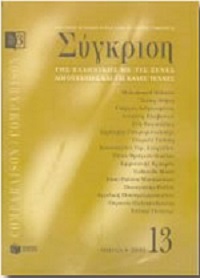Narrative irony in Papadiamantis ' historical novels
Abstract
Irony is an important but underexplored aspect of Alexandros Papadiamantis' poetics. By focusing on his three early novels, this article studies the ways in which irony contributes to the narrator's subversive dialogue with his own narrative act as well as with the literary conventions of the time — notably those of European and Greek romanticism. An analysis of Papadiamantis' narrative techniques shows that in his early novels there is a tendency towards an increasing narrative self-awareness that corresponds to an equally increasing ironical subversion of the conditions of the reception and aesthetic actualization of the narrative process. This ironic self-referentiality reaches its peak in Gyftopoula, the work that marks the end of Papadiamantis' career as writer of historical novels and his turn towards the formally more fragmented narrative genre of short-story (diegema).
Article Details
- How to Cite
-
Ροϊλός Π. (2017). Narrative irony in Papadiamantis ’ historical novels. Comparison, 13, 32–51. https://doi.org/10.12681/comparison.10135
- Issue
- Vol. 13 (2002)
- Section
- Articles

This work is licensed under a Creative Commons Attribution-NonCommercial-ShareAlike 4.0 International License.
Authors who publish with this journal agree to the following terms:
- Authors retain copyright and grant the journal right of first publication with the work simultaneously licensed under a Creative Commons Attribution Non-Commercial License that allows others to share the work with an acknowledgement of the work's authorship and initial publication in this journal.
- Authors are able to enter into separate, additional contractual arrangements for the non-exclusive distribution of the journal's published version of the work (e.g. post it to an institutional repository or publish it in a book), with an acknowledgement of its initial publication in this journal.
- Authors are permitted and encouraged to post their work online (preferably in institutional repositories or on their website) prior to and during the submission process, as it can lead to productive exchanges, as well as earlier and greater citation of published work (See The Effect of Open Access).



